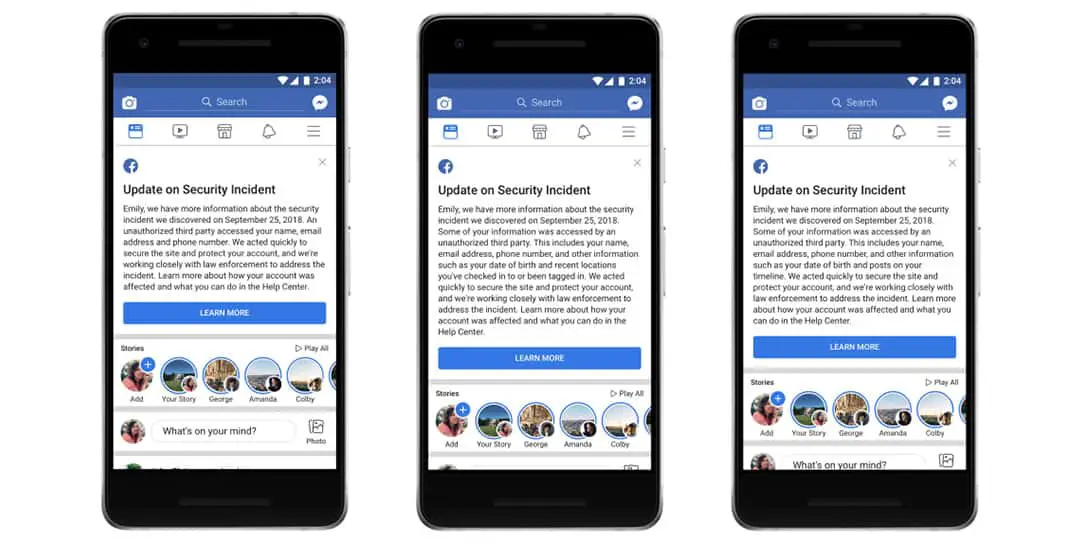Impacted users of the most recent security breach will be notified via a customized message.

It seems that the most recent Facebook security breach has given up details on at least 30 million users. The last report we had on the Facebook security breach pegged affected users at 50 million but Facebook has dug deeper into the issue. The company said they wanted to figure out exactly what had happened and help users understand the situation. The company is also not ruling out the possibility of “smaller-scale” attacks and they are still investigating those.
The Facebook security breach we’re talking about here involved a Facebook feature known as “View As.” View As is a feature that lets people see what their own profile looks like to someone else. It allowed attackers to steal Facebook access tokens, which they could then use to take over people’s accounts. Access tokens are the equivalent of digital keys that keep people logged in to Facebook so they don’t need to re-enter their password every time they use the app.

Here’s how we found the attack that exploited this vulnerability. We saw an unusual spike of activity that began on September 14, 2018, and we started an investigation. On September 25, we determined this was actually an attack and identified the vulnerability. Within two days, we closed the vulnerability, stopped the attack, and secured people’s accounts by resetting the access tokens for people who were potentially exposed. As a precaution, we also turned off “View As.” We’re cooperating with the FBI, which is actively investigating and asked us not to discuss who may be behind this attack.
We now know that fewer people were impacted than we originally thought. Of the 50 million people whose access tokens we believed were affected, about 30 million actually had their tokens stolen. Here’s how it happened:
First, the attackers already controlled a set of accounts, which were connected to Facebook friends. They used an automated technique to move from account to account so they could steal the access tokens of those friends, and for friends of those friends, and so on, totaling about 400,000 people. In the process, however, this technique automatically loaded those accounts’ Facebook profiles, mirroring what these 400,000 people would have seen when looking at their own profiles. That includes posts on their timelines, their lists of friends, Groups they are members of, and the names of recent Messenger conversations. Message content was not available to the attackers, with one exception. If a person in this group was a Page admin whose Page had received a message from someone on Facebook, the content of that message was available to the attackers.
The attackers used a portion of these 400,000 people’s lists of friends to steal access tokens for about 30 million people. For 15 million people, attackers accessed two sets of information – name and contact details (phone number, email, or both, depending on what people had on their profiles). For 14 million people, the attackers accessed the same two sets of information, as well as other details people had on their profiles. This included username, gender, locale/language, relationship status, religion, hometown, self-reported current city, birthdate, device types used to access Facebook, education, work, the last 10 places they checked into or were tagged in, website, people or Pages they follow, and the 15 most recent searches. For 1 million people, the attackers did not access any information.
This particular Facebook security breach did not affect Messenger, Messenger Kids, Instagram, Whats App, Oculus, Workplace, Pages, payments, third-party apps or advertising or developer accounts. Facebook says users can check to see if they were affected by visiting their Help Center. Over the next few days, the company will also be sending out customized messages to the 30 million users, explaining what data was accessed by the hackers and what steps they can take.
